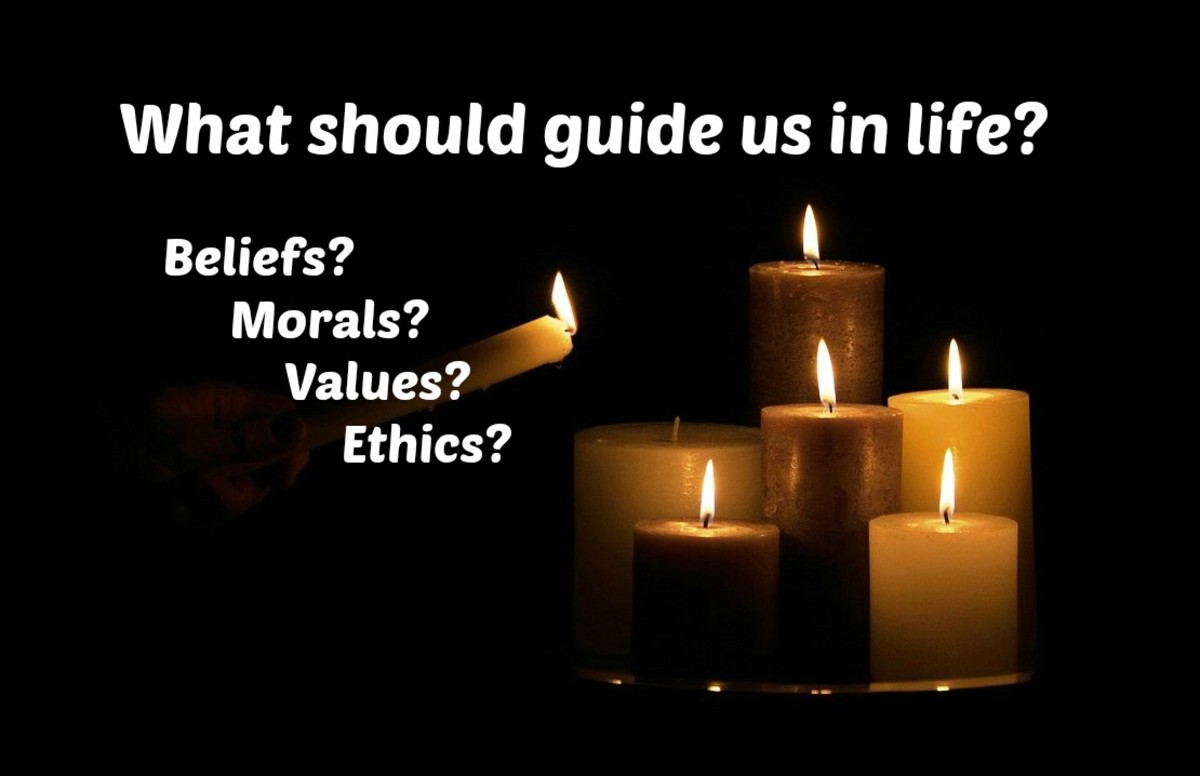Why do Atheists argue with the faithful? (a response to CertifiedHandy's question)

Why bring this matter to the table?
I am writing this hub for an unusual reason. A hubber who I have noticed raise his impassioned and faithful voice on a number of occasions asked a question which I found intriguing. I wrote an answer which I felt was both rational and appropriate... yet when I went back to see what response was given - I found he had deleted my answer out of hand without responding to it. At first I was a little hurt at such lack of consideration... then I thought back over my words and phraseology only to realize just how pompous and self-righteous had been the manner in which I had given my opinion. I had attempted to express a middle-ground opinion... but I had used a language of anger and frustration to say it. This, I believe, is half the problem with this type of discussion. The subject matter is a touch-paper for emotional responses.
In this hub, I shall attempt to make good on my original intention and make the middle-ground case again. This time, I will give the subject matter the time and respect it deserves.



And so to the meat of the matter...
I was brought up a staunch Roman Catholic and was very much a believer for many years. Then I began to read philosophy. I also developed at the same time a growing interest in science. This lead me to lose my faith utterly. For a long time, and right through my years studying philosophy at university I was one of those creatures whom CertifiedHandy so reviles... a passionately atheist and anti-religious fellow with a chip on his shoulder about being lied to by the church.
I have since moderated my opinion and do in fact believe in the existence of a supreme creative Being whose essence is our entire existence.
The reason I hope that my opinion might be of some value in coming to understand why people argue in the way they do against the idea of there being a God is simply because I have been (in the past) one of those Atheists who argue from such a position.
Essentially what I ask for from both sides of this debate is only what Jesus himself taught - and that is tolerance and understanding. It is not necessary to fill oneself with righteous anger. If you truly believe in the teachings of Christ then forgive and move on. Do not rise to the venom behind your opposer's words (if such exists). The same goes for the Atheists. Do not let the evangelists rile you so! Remember that they evangelize essentially because they truly believe that if you do not convert you are going to hell, and they want to 'save your soul'. You can understand their raging and passionate displays when you see yourself through their eyes. The fact that you may see that narrow view of you and your beliefs as a gross distortion is immaterial to the fact that most of them genuinely think they're trying to help you. Their intentions are not bad - they merely believe different things about the world than you.
I heard a Psychology lecture on itunes-U about emotion-regulation recently in which the Professor (Dr. James Gross) said something that really struck a chord with me. He pointed out that a lot of the time, people allow themselves to be ruled by their emotions because of a common misconception. This is the misconception that there is nothing between an event and our reaction to it. In other words, we perceive something and then react to it. What Dr. Gross points out, is that there is always something between the thing we perceive and our reaction to it... and that thing is a belief. What that belief (or group of beliefs) is, determines how we react to the stimulus. This is an incredibly empowering thing to realize because beliefs can be changed by choice! This means that we have a lot more choice in how we react to things emotionally than initially assumed by most people.
It is also a demonstrable scientific fact that emotionally charged people, especially angry ones, are measurably less capable of using their reasoning abilities in a coherent or effective way. Yup, that's right, you literally become less capable of rational thought and (equally frustrating) less capable of expressing yourself fully, when you are angry. This is why it's a good idea to cool down before responding to anything that has been said to you that really hit a nerve. It is one of the reasons many people have so many fights that end unsatisfactorily in their relationships.
These same traits are obvious also in discussions of faith - and in fact that example is analogous on several levels, but I digress...
...Speaking from experience I can say honestly that for those Atheists who once had real faith - there is pain and trauma and an immense feeling of betrayal that comes with losing one's faith. That naturally makes one antagonistic towards those who (In the eyes of that sort of Atheist) stand for not only the lies they believe they have been told, but also as a reminder of what they have lost. This was the case with myself but it is not the case with all Atheists. Indeed a large percentage (and growing) were raised in secular households with no indoctrination of any creed or dogma.
I have read on some hubs and answers to questions the opinion of many Christians who seem to believe that all Atheists are simply people who have lost their faith and are bitter and argumentative about it. To be honest - many secularists I know (very moral people all) rarely consider even bringing up the topic. It just isn't relevant to them or their lives. They aren't bitter about anything. If they get riled with a Christian it is because they are being preached at or judged for their beliefs. The number of times I have heard a none-believer express incredulity over the hypocrisy of people who profess to follow Christ's teachings and yet go about judging people and behaving in a most UN-Christian way is quite depressing.
The thing I try to remember in these moments, is that it is not Christianity that is at fault... but rather those professing to be Christian and yet not behaving according to their own beliefs.
Let me not give the impression in defending Christianity that I am Christian truly though... I am a believer in God only. I believe in aspiring to be 'Christ-like' but also 'Bhudda-like' and on and on. Fill in the name of the enlightened holy-man as you please. There are more similarities between the teachings of all of these great teachers than there are differences. They all preach love, peace, equality, respect, unity and enlightenment in their own way. All paths lead to the same place. All roads are but one road seen from different angles along the way.
A clear explanation of common mistakes made when people argue a point
CertifiedHandy's addendum...
In an addendum to his original question, CertifiedHandy asked whether it was rational to argue against something which one doesn't believe in. Unfortunately, the fact that this question was even asked demonstrates a clear misunderstanding of what the word 'rational' means. For the elucidation of those who are unclear, 'rational' means: Based on or in accordance with reason or logic (web definition). Let us answer this using formal logic then...
Premise A: An argument is an attempt to persuade someone to adopt a belief about something using reason or logic.
Premise B: The Atheist position that there is no God is a belief.
Premise C: The Theist position that there is a God is also a belief.
Conclusion: Since both Atheistic and Theistic positions are beliefs and to argue either position requires reasoning, (remember we have already ascertained that 'rational' means 'based on reason or logic') then it follows that an argument in favor of either position can be considered rational.
This will stick in the craw of any Atheist who doesn't like to consider their beliefs 'knowledge'... but the rules of logic are strict, and they apply equally. It is not rational to claim that you 'know' there is not such a thing as God any more than it is rational to claim that you 'know' that there is one.
Besides this rather strict approach to the question at hand... what about the sheer common sense of it. To somone raised in a secular way with no upbringing of faith it would seem utterly irrational to believe in something they have had no personal experience of nor any cultural reason to accept that it is true. 'So what if you have an old book that says stuff in it about God and whatknot?' You may here them cry, 'I believe only empirical evidence that is testable and measurable!'
To conclude...
I could go full on into a debate here as to the pros and cons for and against the existence of God... but that is not the point of this hub. The question was: Why do Atheists argue with the faithful? I came to these conclusions:
- Those who 'lost their faith' have strong negative emotional reactions to their past beliefs and so react emotionally when confronted with those beliefs.
- Those with a secular upbringing feel put upon by those proselytizers of what seems to them an irrational and erroneous way of viewing the world.
The addendum question was: Is it rational to argue against something you don't believe? My conclusion was simply that the answer is actually contained in the question. It is always rational to argue for or against a belief. It is only accurate to say a belief is irrational - it is not so accurate to say arguing for or against a belief is irrational. Argument by dint of its nature is necessarily a rational process.
I may at some point approach the subject of what I believe rather than talk about the beliefs of others... but I will leave that for next time I think. Peace :)
Links to other relevant hubbers
- On Becoming a Christian
Are you curious about Christians? Do you wonder how to become a Christian? Who are these fanatics? What do they believe? - Faith vs Reason
Other philosophical hubs by me
- The importance of Philosophising
A hub explaining why I believe it is important to philosophise... - H.O.W. in the hell are we to change the world paradigm for the better?
Changing the world paradigm into one of positivity, compassion and peace. Spotlight on a charitable organization called Lend With Care. - Should I eat meat? That is the question!
A hub in response to fellow hubber's defense of meat eating. This may be a contentious one. Bring it on! :)










